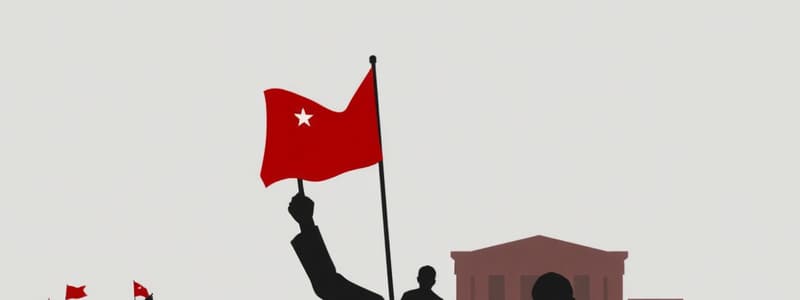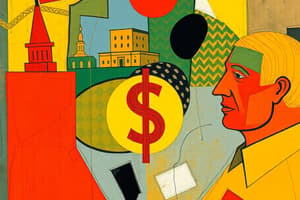Podcast
Questions and Answers
What aspect does political economy primarily examine?
What aspect does political economy primarily examine?
- The historical contexts of political regimes
- The relationship between government actions and economic outcomes (correct)
- The structure of political systems
- The cultural impacts on governance
Which statement best describes a dictatorship?
Which statement best describes a dictatorship?
- Power is shared among elected representatives.
- Power is held by a monarch with limited authority.
- Power is derived from a democratic election process.
- Power is concentrated in an individual or small group without democratic processes. (correct)
What is a key characteristic of a democracy?
What is a key characteristic of a democracy?
- Citizens have no role in decision-making.
- Citizen participation is discouraged.
- Elections determine government officials and policies. (correct)
- Laws are created solely by a monarch.
How do different political ideas like capitalism and socialism affect economic outcomes?
How do different political ideas like capitalism and socialism affect economic outcomes?
What role do institutions and laws play in political systems?
What role do institutions and laws play in political systems?
What is a common outcome promoted by socialist policies?
What is a common outcome promoted by socialist policies?
Which of the following best defines citizen participation?
Which of the following best defines citizen participation?
What is a major focus of political economy in relation to power dynamics?
What is a major focus of political economy in relation to power dynamics?
What is a key characteristic of social democracy?
What is a key characteristic of social democracy?
What is a significant role of the government in modern socialism?
What is a significant role of the government in modern socialism?
Which of the following best describes individualism?
Which of the following best describes individualism?
What do socialist countries often prioritize in their political and economic decisions?
What do socialist countries often prioritize in their political and economic decisions?
What is a defining feature of totalitarianism?
What is a defining feature of totalitarianism?
What does the Corruption Perceptions Index (CPI) measure?
What does the Corruption Perceptions Index (CPI) measure?
Which of the following best describes the approach of modern socialism towards social welfare?
Which of the following best describes the approach of modern socialism towards social welfare?
Which aspect does Ka Leody de Guzman emphasize in his political platform?
Which aspect does Ka Leody de Guzman emphasize in his political platform?
Which of the following is NOT a characteristic of totalitarianism?
Which of the following is NOT a characteristic of totalitarianism?
In social democracy, what is emphasized for achieving economic goals?
In social democracy, what is emphasized for achieving economic goals?
What was a significant origin of the communist movement in the Philippines?
What was a significant origin of the communist movement in the Philippines?
What is the primary focus of individualism in society?
What is the primary focus of individualism in society?
What is a current characteristic of the communist movement in the Philippines?
What is a current characteristic of the communist movement in the Philippines?
What is the primary aim of modern socialism regarding society?
What is the primary aim of modern socialism regarding society?
Which country is commonly cited as an example of totalitarianism?
Which country is commonly cited as an example of totalitarianism?
In what electoral context did Ka Leody de Guzman operate?
In what electoral context did Ka Leody de Guzman operate?
What does Gross National Income (GNI) measure?
What does Gross National Income (GNI) measure?
What is the main risk of printing more money in a country's economy?
What is the main risk of printing more money in a country's economy?
How is GDP per capita calculated?
How is GDP per capita calculated?
Why might GDP per capita be higher in industrialized countries?
Why might GDP per capita be higher in industrialized countries?
What is the purpose of Purchasing Power Parities (PPPs)?
What is the purpose of Purchasing Power Parities (PPPs)?
What is indicated by higher life expectancy in a country?
What is indicated by higher life expectancy in a country?
Which component is NOT used to measure the Human Development Index?
Which component is NOT used to measure the Human Development Index?
What does the 'expected years of schooling' metric directly assess?
What does the 'expected years of schooling' metric directly assess?
Which measure assesses the standard of living in a country?
Which measure assesses the standard of living in a country?
What does a higher Gross National Income (GNI) per capita generally signify about a country's citizens?
What does a higher Gross National Income (GNI) per capita generally signify about a country's citizens?
Which of the following is a likely outcome of better healthcare systems in a country?
Which of the following is a likely outcome of better healthcare systems in a country?
Which two indices are used to measure education within the Human Development Index?
Which two indices are used to measure education within the Human Development Index?
What aspect does not influence the evaluation of the standard of living?
What aspect does not influence the evaluation of the standard of living?
Which demographic factor is NOT directly factored into the Human Development Index?
Which demographic factor is NOT directly factored into the Human Development Index?
How does life expectancy at birth serve as a measure for a country's health?
How does life expectancy at birth serve as a measure for a country's health?
Flashcards are hidden until you start studying
Study Notes
Political Economy
- Examines the relationship between politics and economics
- How government decisions, like taxes and regulations, impact the economy
- Focuses on power dynamics and resource control
- Explores how different political ideologies impact economic outcomes
Political Systems
- Democracy: Citizens elect representatives through regular elections
- Monarchy: Power is held by a monarch (king or queen)
- Dictatorship: Power is held by an individual or a small group, with no democratic process
Modern Socialism
- Promotes equal opportunities in education, healthcare, and employment
- May involve government ownership and management of key industries
- Focuses on public welfare and expanding social welfare programs
- Encourages citizen participation in decision-making
Individualism
- Values individual freedom, personal responsibility, and private property
- Promotes the pursuit of personal goals and ambitions
- Favors limited government interference in individual lives
Totalitarianism
- Absolute power of the state over all aspects of life, including the media, education, and economy
- Control over thoughts and beliefs through propaganda and censorship
- Lack of freedom for citizens: speech, press, and action are restricted or banned
- Repression of opposition, often with severe punishments
Corruption Perceptions Index
- Ranks countries based on their perceived levels of public sector corruption
- Corruption is defined as abuse of entrusted power for private gain
Human Development Index (HDI)
- Measure of a country's overall development based on:
- Health: Life expectancy at birth
- Education: Mean years of schooling and expected years of schooling
- Standard of Living: Gross National Income per capita adjusted for purchasing power parity (PPP)
Economic Development
- Gross National Income (GNI): Total amount of money earned by a nation's people and businesses
- Gross Domestic Product (GDP): Often used to measure the economic health of a country or region
- Purchasing Power Parity (PPP): Rates of currency conversion that equalize purchasing power across countries
Hyperinflation
- Printing more money without an increase in the production of goods and services leads to inflation, which can lead to hyperinflation
- Hyperinflation occurs when prices rise rapidly, eroding the value of currency and leading to economic instability.
- Occurs when excessive money supply is introduced into the economy
GDP Per Capita
- Economic metric that measures a country's economic output per person.
- Used to determine a country's prosperity and economic growth
- Calculated by dividing a country's GDP by its population
Wealth and Poverty
- GDP per capita is used as an indicator of wealth and poverty.
- Developed and industrialized countries with smaller populations often have higher GDP per capita.
Studying That Suits You
Use AI to generate personalized quizzes and flashcards to suit your learning preferences.




